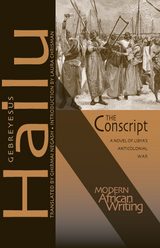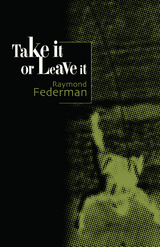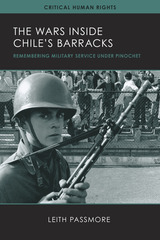3 books about Draftees

The Conscript
A Novel of Libya’s Anticolonial War
Gebreyesus Hailu
Ohio University Press, 2013
Eloquent and thought-provoking, this classic novel by the Eritrean novelist Gebreyesus Hailu, written in Tigrinya in 1927 and published in 1950, is one of the earliest novels written in an African language and will have a major impact on the reception and critical appraisal of African literature. The Conscript depicts, with irony and controlled anger, the staggering experiences of the Eritrean ascari, soldiers conscripted to fight in Libya by the Italian colonial army against the nationalist Libyan forces fighting for their freedom from Italy’s colonial rule. Anticipating midcentury thinkers Frantz Fanon and Aimé Césaire, Hailu paints a devastating portrait of Italian colonialism. Some of the most poignant passages of the novel include the awakening of the novel’s hero, Tuquabo, to his ironic predicament of being both under colonial rule and the instrument of suppressing the colonized Libyans. The novel’s remarkable descriptions of the battlefield awe the reader with mesmerizing images, both disturbing and tender, of the Libyan landscape—with its vast desert sands, oases, horsemen, foot soldiers, and the brutalities of war—uncannily recalled in the satellite images that were brought to the homes of millions of viewers around the globe in 2011, during the country’s uprising against its former leader, Colonel Gaddafi.
[more]

Take It or Leave It
Raymond Federman
University of Alabama Press, 1976
As told, or rather retold second-hand, by the narrator, Take It or Leave It relates the hilarious and amorous adventures of a young Frenchman who has been drafted into the U.S. Army and is being shipped Overseas to fight in Korea. The obsessed narrator retells, as best as he can, what the young man supposedly told him as they sat under a tree. He recounts how the young man escaped German persecution during World War Two, how he came to America and struggled to survive before joining the "rah rah spitshine" 82nd Airborne Division, and how, because of a "typical Army goof," he must travel in an old beat-up Buick Special from Fort Bragg to Camp Drum to collect the money the Army owes him, before he can set out for "the great journey cross-country" to San Francisco where he will embark for Overseas.
Moving freely from past to present (and Vice Versa), and from place to place leap-frogging from digression to digression, Take It or Leave It explores new possibilities of narrative technique. Whie the story of Frenchy is being told, the narrator involves his listeners in digressive arguments about politics, sex, America, literature, laughter, death, and the telling of the story itself. Consequently, as this "exaggerated second-hand tale to be read aloud either standing or sitting" progresses, it also deviates from its course, and eventually cancels itself as the voices of the fiction multiply. Take It or Leave It, the ultimate postmodern novel, makes a shamble of traditional fiction and conventional modes of writing, and does so with effrontery and laughter.
Moving freely from past to present (and Vice Versa), and from place to place leap-frogging from digression to digression, Take It or Leave It explores new possibilities of narrative technique. Whie the story of Frenchy is being told, the narrator involves his listeners in digressive arguments about politics, sex, America, literature, laughter, death, and the telling of the story itself. Consequently, as this "exaggerated second-hand tale to be read aloud either standing or sitting" progresses, it also deviates from its course, and eventually cancels itself as the voices of the fiction multiply. Take It or Leave It, the ultimate postmodern novel, makes a shamble of traditional fiction and conventional modes of writing, and does so with effrontery and laughter.
[more]

The Wars inside Chile's Barracks
Remembering Military Service under Pinochet
Leith Passmore
University of Wisconsin Press, 2020
From 1973 to 1990 in Chile, approximately 370,000 young men—mostly from impoverished backgrounds—were conscripted to serve as soldiers in Augusto Pinochet's violent regime. Some were brutal enforcers, but many themselves endured physical and psychological abuse, survival and torture training, arbitrary punishments, political persecution, and forced labor. Leith Passmore examines the emergence, in the early twenty-first century, of a movement of ex-conscripts seeking reparations. The former soldiers challenged the politics of memory that had shaped Chile's truth and reconciliation efforts, demanding recognition of their own broken families, ill health and incapacity to work, and damaged sense of self.
Relying on unpublished material, testimony, interviews, and field notes, Passmore locates these individuals' narratives of victimhood at the intersection of long-term histories of patriotism, masculinity, and cyclical poverty. These accounts reveal in detail how Pinochet's war against his own citizens—as well as the "almost-wars" with neighboring Peru, Bolivia, and Argentina—were also waged inside Chile's army barracks.
Relying on unpublished material, testimony, interviews, and field notes, Passmore locates these individuals' narratives of victimhood at the intersection of long-term histories of patriotism, masculinity, and cyclical poverty. These accounts reveal in detail how Pinochet's war against his own citizens—as well as the "almost-wars" with neighboring Peru, Bolivia, and Argentina—were also waged inside Chile's army barracks.
[more]
READERS
Browse our collection.
PUBLISHERS
See BiblioVault's publisher services.
STUDENT SERVICES
Files for college accessibility offices.
UChicago Accessibility Resources
home | accessibility | search | about | contact us
BiblioVault ® 2001 - 2024
The University of Chicago Press









